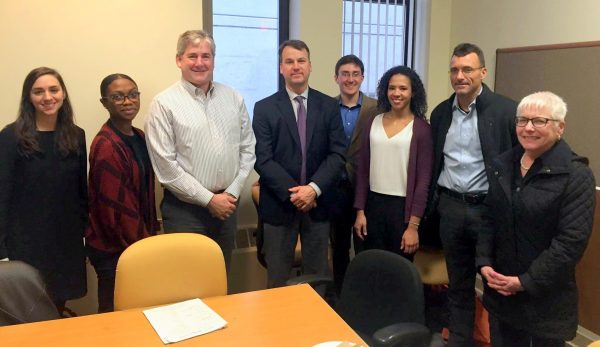Helping the Homeless: FM Global
There was no formal pro bono program in place at FM Global in 2013 when attorney Jon Mishara took over the management of the Rhode Island-based insurance company’s legal department as senior vice president and general counsel, so he quickly got to work establishing one and seeking out volunteer opportunities for his team.
Jon reached out to the Lawyers Clearinghouse to inquire about its programs and learned that there were many ways for in-house counsel to get involved. He then accepted an invitation to attend a legal clinic at Pine Street Inn, a local homeless shelter.

Today, Jon coordinates the company’s official pro bono program with colleague Robert Brunelli, Vice President and Assistant General Counsel. Under their watch, the FM Global legal department has partnered with the Clearinghouse’s Legal Clinic for the Homeless program and FM Global attorneys have volunteered at a number of clinics, where they work with lawyers from area law firms to provide free civil legal assistance to those who are homeless and very low-income.
Jon says that through the clinics, FM Global attorneys have handled matters such as immigration, housing, benefits appeals, CORI issues, and some small claims cases – topics they don’t deal with in their day-to-day work.
“[The clinic] gives lawyers an opportunity to hone their legal skills and get involved in areas of practice they would not typically get involved in in the in-house setting,” he says. “It places them outside of their comfort zones and allows them to engage in new experiences as an attorney.”
Program co-coordinator Robert is working on one such case now, as he tries to help a Legal Clinic client who is struggling with immigration issues. Though Robert has no experience with immigration law, he is conducting his own research and even attended a recent Continuing Legal Education (CLE) course. He says he’s prepared to consult with immigration attorneys if necessary.
While such a volunteer commitment might sound daunting to attorneys with limited free time, Jon and Robert agree that pro bono offers something for everyone and that programs like the Clearinghouse’s Legal Clinic allow attorneys to pick and choose how much time they want to devote to volunteering. They are welcome to simply attend a clinic and conduct intake with clients, or they can decide to take on a full matter.
One of the biggest barriers keeping in-house attorneys from participating in pro bono, Jon says, is the notion that setting up a formal in-house program is complicated and time consuming. While the process does require the devotion of some company resources, he says the necessary information is readily available. He suggests in-house departments make use of the Association of Corporate Counsel’s pro bono kit, which can be tailored to fit a company’s specific needs. The kit explains how to set up a pro bono committee, how to establish a formal policy, and outlines other key steps.
Once a company has a formal pro bono program in place, it’s simply a matter of partnering with organizations like the Clearinghouse, which offer established volunteer opportunities. FM Global attorneys have also partnered with programs in Rhode Island, where the company is headquartered and where many of its attorneys are licensed.
Overall, Jon and Robert say the experience has been eye-opening for FM Global attorneys, who have greatly enjoyed volunteering with the Clearinghouse and working with outside counsel. And although, Jon says, many volunteers may kick off their first pro bono experience with some “degree of trepidation,” “once you put your toe in the water, start to engage and see results, you learn that you’re actually providing a very valuable service to the clients and your nervousness quickly dissipates.”